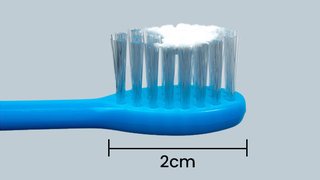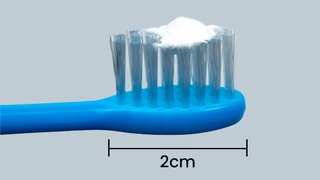How to take care of your baby or toddler's teeth
Once your baby's first milk tooth breaks through, it's time to start showing them good dental hygiene.
It's important for your child to have healthy teeth. They help them eat, speak, and smile confidently. Milk teeth also help to align and space their permanent teeth.
You can help your little one maintain a lifetime of healthy smiles by teaching them good dental habits, such as regular brushing and not eating or drinking too much sugar.
Video: Tips on keeping your baby's teeth healthy
Dr Sara Kayat, mum to a teething 6 month old, shares our Start for Life tips on keeping your little one's teeth healthy.
When to start brushing your child's teeth
Plaque is a film of bacteria that forms on teeth and causes tooth decay and gum disease. Even the littlest teeth can collect it.
Brushing your child’s teeth as soon as they come through will help to remove plaque and keep their teeth and gums healthy as they grow.
Do
-
use a smear (the size of a grain of rice) of toothpaste for babies and toddlers up to 3 years
-
use a pea sized amount of toothpaste for children aged 3 to 6
-
brush your child’s teeth last thing at night and on 1 other occasion
-
use a toothpaste with at least 1,000 ppm (parts per million) fluoride
-
replace your child's toothbrush every 3 months or sooner
-
encourage your child to spit out toothpaste and not swallow it
Don’t
-
do not rinse with water after brushing as it washes away fluoride
-
do not let your child eat or lick toothpaste from the tube
Did you know?
Toothbrushes made for young children have a small head and soft bristles.
Food and drink for healthy teeth
Having healthy teeth and gums also means eating and drinking the right things too.
It's not just about the amount of sugar in sweet food and drinks, it is also how often they are consumed.
Fizzy drinks, soft drinks, juice drinks and sugary squashes can all lead to tooth decay.
The best drink for your child is unflavoured milk or water. Check out our page on food and drinks to avoid for more information.
Do
-
only give breastmilk, infant formula or cooled water in a bottle to your baby (water can be given at around 6 months old)
-
use an open cup or a free-flow cup without a valve to help your baby learn to sip (it's also better for their teeth)
-
keep sugary foods and drinks to mealtimes
-
ask a pharmacist or GP if there's a sugar-free option if your child needs medicine
Don’t
-
do not encourage the use of baby bottles after your baby is 1 year of age
-
do not give juices or sugary drinks in a baby bottle
-
do not add sugar to food or drinks given to babies and toddlers
-
do not give sugary snacks between meals or at bedtime
Did you know?
Babies under 1 year of age do not need snacks. If you think your baby is hungry in between meals, offer extra milk feeds instead.
Baby pouches and tooth decay
Food sucked directly from a baby pouch can also cause tooth decay.
For inspiration on healthy recipes for children of all ages, visit our recipes and meal ideas page.
When should I take my child to a dentist?
See a dentist as soon as possible if you think you or your child has tooth decay. Early treatment can help stop it getting worse.
NHS dental care in England is free if you are:
- a child under 18, or under 19 and in full-time education
- pregnant or have had a baby in the last 12 months
You can also take your child to your own dental appointments so that they get used to the experience. It may help to reduce any fear or worry they may have about visiting the dentist as they grow.
Help and support
Getting into the teeth brushing routine can take time, you can talk to your midwife, health visitor or other health professional if you have any concerns.
Family Hubs can also provide support on a wide range of parenting topics, including dental health.


